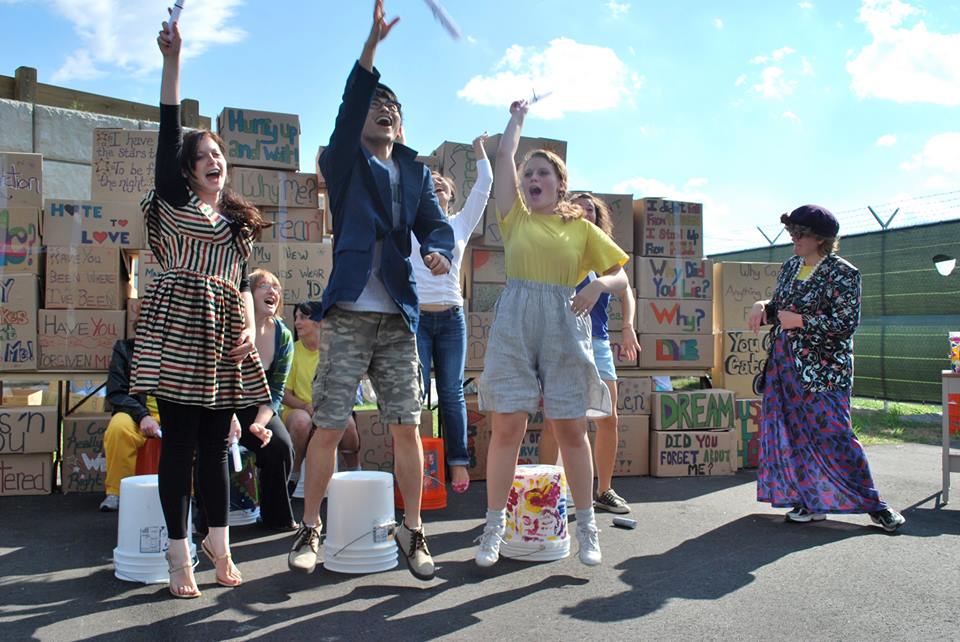Telling My Story has a deep impact on both participants and community audience members. What follows are but a few examples.
Participants
“At first it feels like a huge thing — to write and perform a piece of our collective experience. Too big — almost insurmountable! But with encouragement and persistence, the story gets written. The details work themselves out and by the time of the performance, the dramatic piece that we are showing is merely an extension of ourselves. We are surprised because we don’t know how we got here to do this amazing thing. But we are here, because we did do it — we are successful because we did it together. We are learning that the best drama is not a solitary piece, but a collective. Telling My Story was not so much about putting on a play — that became secondary — to learning how to successfully practice living life and feeling better about ourselves.”
— Inmate Participant
In 2005, Dartmouth student Christina Stoltz entered the Southeast State Correctional Facility for Women in Windsor, Vermont and it saved her life. Here’s her story.
“This program allows people to express how they are feeling — what type of life they have lived — growing up in their neighborhood, etc. Doing that without being judged or labeled is a very difficult thing to do. There are very few places that someone could do that, and this program gives everyone the option if they so choose.”
— David, Inmate Participant
“We were able to take knowledge we already had and put it to something positive. After our performance we were asked to write a testimony about ourselves. That was the best part of this program, because after you take away all the crying and laughing, you were left with the most amazing stories you will ever hear. For the first time since I have gotten in trouble, I was able to tell my story. People heard my voice and listen to what I had to say. It was an opportunity I don’t think other inmates have.”
— Inmate Participant
“I definitely urge others to take the time to learn something that might not otherwise experience. It has helped me to take the time in analyzing situations that in the past have led me to disaster.”
— Andrew, Inmate Participant
“I only had two weeks to practice our play, and to practice and perform the African dance. Even though it seemed like a lot of work, I had ton amount of fun and it sincerely empowered me. It made me feel much better about myself and the world. To that I could do it and that some of the world does care.”
— Inmate Participant
“This is the most profitable class I’ve participated in since being incarcerated. The learning experience required inner change, patience, compromise, sacrifice and commitment. Just when it seemed easiest to give up and quit, someone in the class would say something to rejuvenate class energy. At a time when confrontation amounted to tongue lashing and verbal shouting matches, someone reminded us all of how far we had come along. Further more, the worthiness of the project was to send a message. It was not an individual platform. This was a united message that was being portrayed in a semi-family type fashion.”
— Matt, Inmate Participant
“Not only did I truly enjoy the experience, but it was incredibly formative for me, and it is still something I think about often months later. From writing and improvisation exercises, to intense discussions, to writing, producing, and acting in a play, this program has taught me a lot about myself and what I am capable of. In addition, the testimony to follow allowed me, or actually forced me, to really confront what has been on my mind lately. I am indebted to the program for teaching me more than I learned at a $40,000-per-year college.”
— Amanda, College Student Participant
Community Audience
“The subject matter was life in prison from the standpoint of the prisoners. What Pati Hernandez succeeded to produce was nothing less than a catharsis of that extreme social situation. Sad and funny and emotionally charged sketches combined with slapstick, culminated in personal speeches of individual prisoners, addressing both, the audience at hand and society at large about their lives and what led them to their plight.”
— Peter Schumann, Director, Bread & Puppet Theater
“Ms. Hernandez has approached the students population with respect and dignity. She has earned and promoted their participation, willingness to achieve, and their honest effort to do their best. This is a most admirable and notable accomplishment. To bring a group of young adults and adult students, many with very little formal educational training, most of whom are school failures, to a place where they are enjoying Fine Arts and English/Language Arts, is remarkable.”
— Robert Lucenti, Director of Education, Vermont Community High School
“The range of characters, personalities and temperaments comprising each cast makes for and astonishing and truly inspiring final production. Pati begins with a group of “separate” individualists and gently, but professionally, supports the coordination of a unified voice. The members find the opportunity to write, perform and “be heard” very empowering.”
— Mary Nelson, Special Educator, Northern State Correctional Facility
“Pati Hernandez’s theater workshops are important. This is a time when long incarceration is the answer to society’s anxiety about criminal behavior — the mildest as well as the most vicious. She has another answer. She describes the major work of this theater as EMPOWERMENT. For what? Well, for self-understanding which is one of the best roads to take on the way back into society.”
— Grace Paley, Poet
